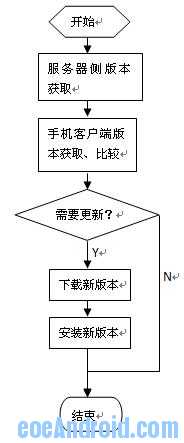Android应用的自动升级、更新模块的实现完整方案+参考程序代
看到很多人求自动更新功能的实现模块
结合网上资源 给出完整解决方案加参考程序打包(源码仓库特点,必有打包工程{:4_84:})
希望自行实现整理
另如果你有好的代码也可以分享出来 不只是交换苹果而已
希望多支持源码仓库 争做eoe最好的版块
我们看到很多Android应用都具有自动更新功能,用户一键就可以完成软件的升级更新。得益于Android系统的软件包管理和安装机制,这一功能实现起来相当简单,下面我们就来实践一下。首先给出界面效果:
1. 准备知识
在AndroidManifest.xml里定义了每个Android apk的版本标识:
- <manifest xmlns:android="http://schemas.android.com/apk/res/android"
- package="com.myapp"
- android:versionCode="1"
- android:versionName="1.0.0">
- <application></application>
- </manifest>
其中,android:versionCode和android:versionName两个字段分别表示版本代码,版本名称。versionCode是整型数字,versionName是字符串。由于version是给用户看的,不太容易比较大小,升级检查时,可以以检查versionCode为主,方便比较出版本的前后大小。
那么,在应用中如何读取AndroidManifest.xml中的versionCode和versionName呢?可以使用PackageManager的API,参考以下代码:
- public static int getVerCode(Context context) {
- int verCode = -1;
- try {
- verCode = context.getPackageManager().getPackageInfo(
- "com.myapp", 0).versionCode;
- } catch (NameNotFoundException e) {
- Log.e(TAG, e.getMessage());
- }
- return verCode;
- }
-
- public static String getVerName(Context context) {
- String verName = "";
- try {
- verName = context.getPackageManager().getPackageInfo(
- "com.myapp", 0).versionName;
- } catch (NameNotFoundException e) {
- Log.e(TAG, e.getMessage());
- }
- return verName;
- }
或者在AndroidManifest中将android:versionName="1.2.0"写成android:versionName="@string/app_versionName",然后在values/strings.xml中添加对应字符串,这样实现之后,就可以使用如下代码获得版本名称:
- public static String getVerName(Context context) {
- String verName = context.getResources()
- .getText(R.string.app_versionName).toString();
- return verName;
- }
同理,apk的应用名称可以这样获得:
- public static String getAppName(Context context) {
- String verName = context.getResources()
- .getText(R.string.app_name).toString();
- return verName;
- }
2. 流程框架
3. 版本检查
在服务端放置最新版本的apk文件,如:http://localhost/myapp/myapp.apk
同时,在服务端放置对应此apk的版本信息调用接口或者文件,如:http://localhost/myapp/ver.json
ver.json中的内容为:
- [{"appname":"jtapp12","apkname":"jtapp-12-updateapksamples.apk","verName":1.0.1,"verCode":2}]
然后,在手机客户端上进行版本读取和检查:
- private boolean getServerVer () {
- try {
- String verjson = NetworkTool.getContent(Config.UPDATE_SERVER
- + Config.UPDATE_VERJSON);
- JSONArray array = new JSONArray(verjson);
- if (array.length() > 0) {
- JSONObject obj = array.getJSONObject(0);
- try {
- newVerCode = Integer.parseInt(obj.getString("verCode"));
- newVerName = obj.getString("verName");
- } catch (Exception e) {
- newVerCode = -1;
- newVerName = "";
- return false;
- }
- }
- } catch (Exception e) {
- Log.e(TAG, e.getMessage());
- return false;
- }
- return true;
- }
比较服务器和客户端的版本,并进行更新操作。
- if (getServerVerCode()) {
- int vercode = Config.getVerCode(this); // 用到前面第一节写的方法
- if (newVerCode > vercode) {
- doNewVersionUpdate(); // 更新新版本
- } else {
- notNewVersionShow(); // 提示当前为最新版本
- }
- }
详细方法:
- private void notNewVersionShow() {
- int verCode = Config.getVerCode(this);
- String verName = Config.getVerName(this);
- StringBuffer sb = new StringBuffer();
- sb.append("当前版本:");
- sb.append(verName);
- sb.append(" Code:");
- sb.append(verCode);
- sb.append(",\n已是最新版,无需更新!");
- Dialog dialog = new AlertDialog.Builder(Update.this).setTitle("软件更新")
- .setMessage(sb.toString())// 设置内容
- .setPositiveButton("确定",// 设置确定按钮
- new DialogInterface.OnClickListener() {
- @Override
- public void onClick(DialogInterface dialog,
- int which) {
- finish();
- }
- }).create();// 创建
- // 显示对话框
- dialog.show();
- }
- private void doNewVersionUpdate() {
- int verCode = Config.getVerCode(this);
- String verName = Config.getVerName(this);
- StringBuffer sb = new StringBuffer();
- sb.append("当前版本:");
- sb.append(verName);
- sb.append(" Code:");
- sb.append(verCode);
- sb.append(", 发现新版本:");
- sb.append(newVerName);
- sb.append(" Code:");
- sb.append(newVerCode);
- sb.append(", 是否更新?");
- Dialog dialog = new AlertDialog.Builder(Update.this)
- .setTitle("软件更新")
- .setMessage(sb.toString())
- // 设置内容
- .setPositiveButton("更新",// 设置确定按钮
- new DialogInterface.OnClickListener() {
- @Override
- public void onClick(DialogInterface dialog,
- int which) {
- pBar = new ProgressDialog(Update.this);
- pBar.setTitle("正在下载");
- pBar.setMessage("请稍候...");
- pBar.setProgressStyle(ProgressDialog.STYLE_SPINNER);
- downFile(Config.UPDATE_SERVER + Config.UPDATE_APKNAME);
- }
- })
- .setNegativeButton("暂不更新",
- new DialogInterface.OnClickListener() {
- public void onClick(DialogInterface dialog,
- int whichButton) {
- // 点击"取消"按钮之后退出程序
- finish();
- }
- }).create();// 创建
- // 显示对话框
- dialog.show();
- }
4. 下载模块
- void downFile(final String url) {
- pBar.show();
- new Thread() {
- public void run() {
- HttpClient client = new DefaultHttpClient();
- HttpGet get = new HttpGet(url);
- HttpResponse response;
- try {
- response = client.execute(get);
- HttpEntity entity = response.getEntity();
- long length = entity.getContentLength();
- InputStream is = entity.getContent();
- FileOutputStream fileOutputStream = null;
- if (is != null) {
- File file = new File(
- Environment.getExternalStorageDirectory(),
- Config.UPDATE_SAVENAME);
- fileOutputStream = new FileOutputStream(file);
- byte[] buf = new byte[1024];
- int ch = -1;
- int count = 0;
- while ((ch = is.read(buf)) != -1) {
- fileOutputStream.write(buf, 0, ch);
- count += ch;
- if (length > 0) {
- }
- }
- }
- fileOutputStream.flush();
- if (fileOutputStream != null) {
- fileOutputStream.close();
- }
- down();
- } catch (ClientProtocolException e) {
- e.printStackTrace();
- } catch (IOException e) {
- e.printStackTrace();
- }
- }
- }.start();
- }
下载完成,通过handler通知主ui线程将下载对话框取消。
- void down() {
- handler.post(new Runnable() {
- public void run() {
- pBar.cancel();
- update();
- }
- });
- }
5. 安装应用
- void update() {
- Intent intent = new Intent(Intent.ACTION_VIEW);
- intent.setDataAndType(Uri.fromFile(new File(Environment
- .getExternalStorageDirectory(), Config.UPDATE_SAVENAME)),
- "application/vnd.android.package-archive");
- startActivity(intent);
- }
如果你将apk应用发布到market上,那么,你会发现market内建了类似的模块,可以自动更新或者提醒你是否更新应用。那么,对于你自己的应用需要自动更新的话,自己内建一个是不是更加方便了呢?本文提到的代码大多是在UpdateActivity.java中实现,为了能够使更新过程更加友好,可以在最初launcher的Activity中建立一个线程,用来检查服务端是否有更新。有更新的时候就启动UpdateActivity,这样的使用体验更加平滑。
